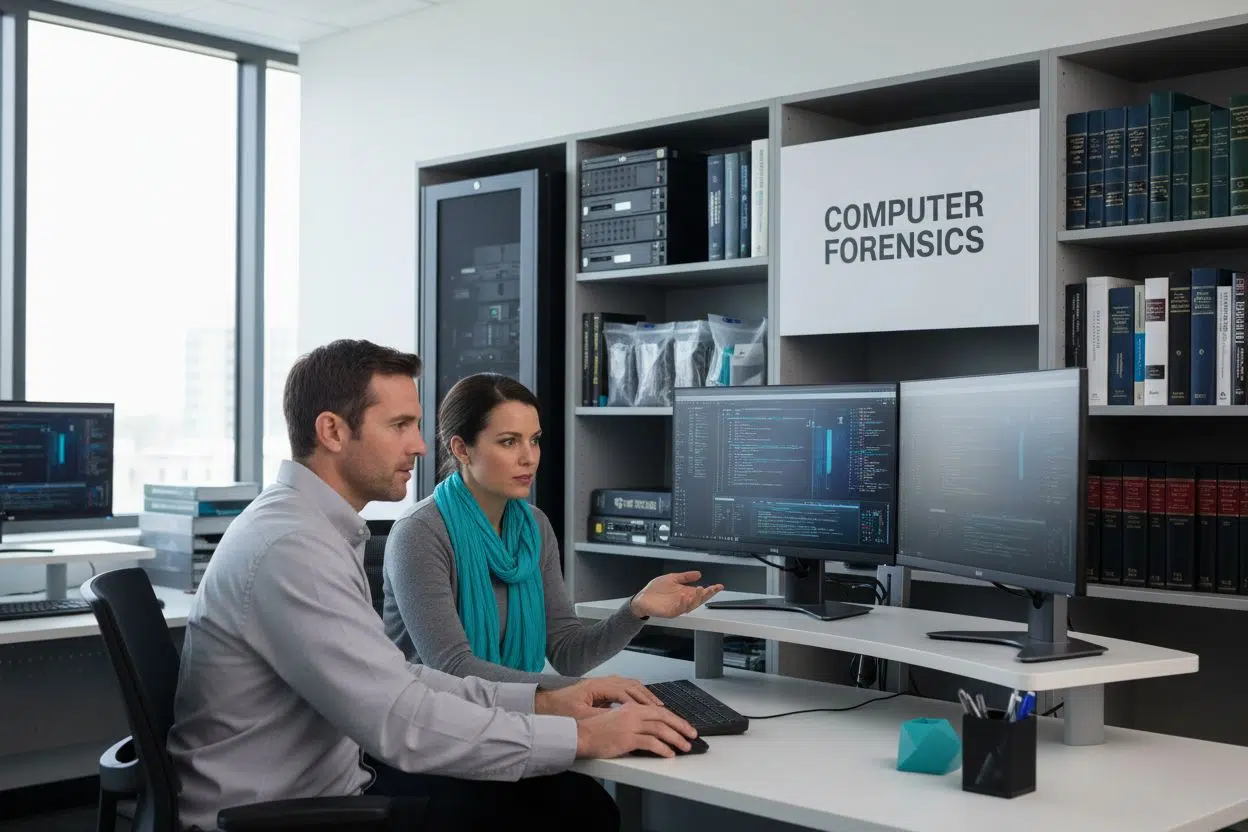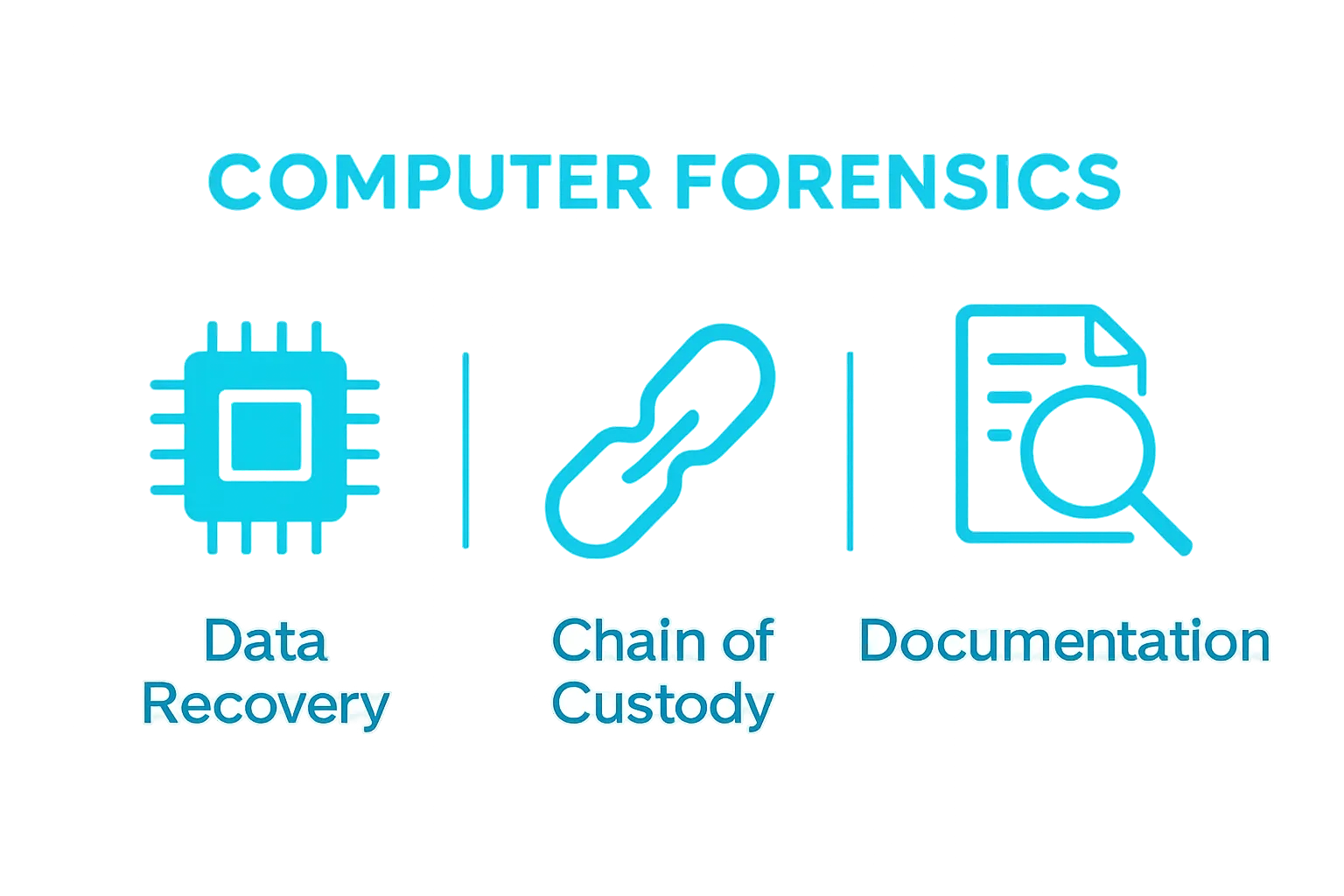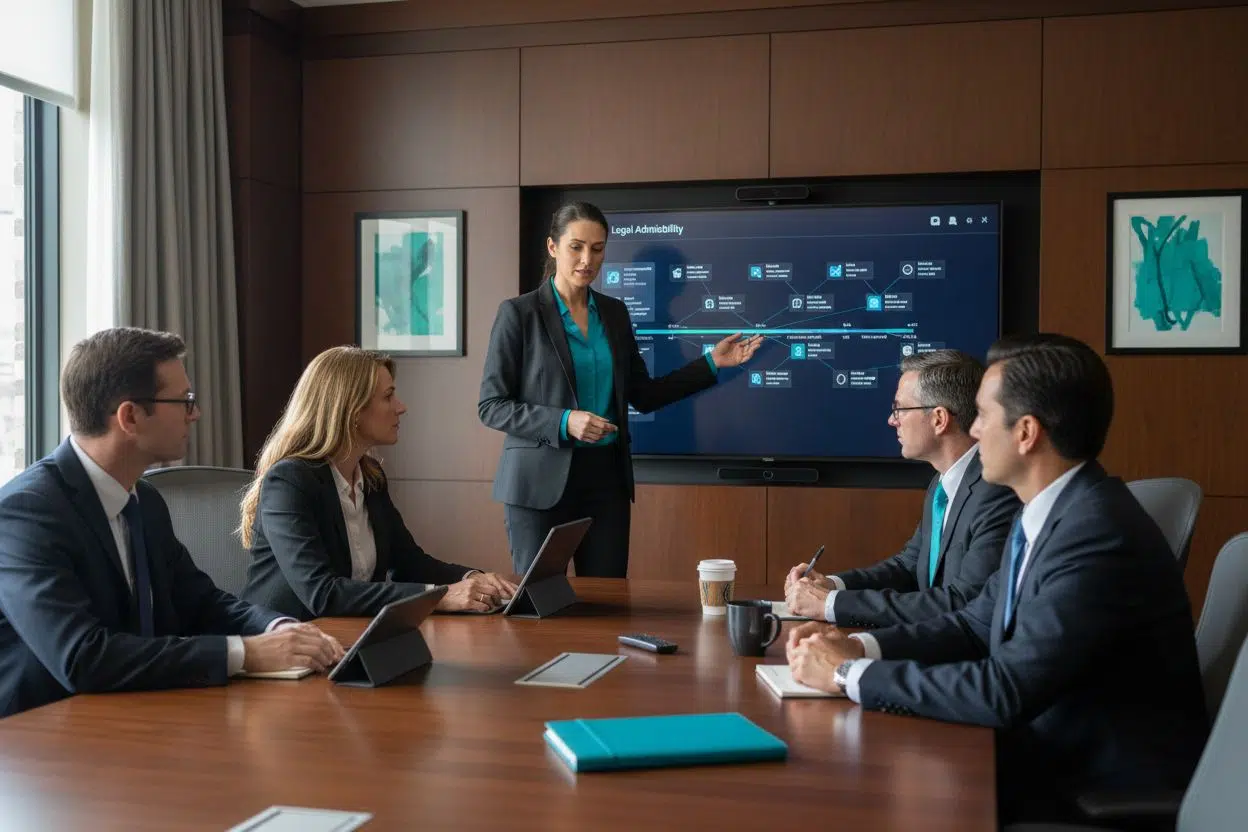Computer forensics might sound like something reserved for top secret agents or headline cybercrime cases, but the truth is it affects almost everyone who uses a digital device. Digital sleuths can recover evidence even after it has been deleted or hidden, and studies show digital forensic evidence is now pivotal in modern legal proceedings. What surprises most is that preserving every digital footprint demands not just technical wizardry, but a strict legal approach to ensure every byte stands up in court.
Table of Contents
- Defining Computer Forensics: What It Is
- The Importance Of Computer Forensics In Legal Matters
- How Computer Forensics Works: Tools And Techniques
- Key Concepts And Principles Of Computer Forensics
Quick Summary
| Takeaway | Explanation |
|---|---|
| Computer forensics aids legal proceedings. | Digital forensics provides essential evidence in civil and criminal cases, influencing outcomes significantly. |
| Preserving evidence is crucial. | Maintaining an unbroken chain of custody and the integrity of digital information ensures credibility in investigations. |
| Specialised tools enhance investigations. | Forensic specialists use sophisticated software and hardware to accurately recover and analyse digital evidence. |
| Legal standards must be followed. | Experts must meticulously document processes to ensure digital evidence is admissible in court. |
| Ethical considerations guide practices. | Investigators must adhere to transparency and neutrality, protecting privacy rights while conducting forensic analysis. |
Defining Computer Forensics: What It Is
Computer forensics represents a sophisticated digital investigation discipline designed to collect, preserve, and analyse electronic evidence from computing devices, networks, and digital storage systems. At its core, this specialised field combines advanced technological expertise with meticulous investigative techniques to uncover critical digital information that can be used in legal proceedings, corporate investigations, and cybersecurity contexts.
The Fundamental Principles of Computer Forensics
Computer forensics experts operate under strict methodological guidelines that ensure the integrity and admissibility of digital evidence. The primary objectives include:
- Recovering deleted, hidden, or encrypted data
- Maintaining a precise chain of custody for electronic evidence
- Documenting every step of the digital investigation process
- Reconstructing digital activities and user interactions
The National Institute of Justice defines computer forensics as a systematic approach to examining digital media, ensuring that investigators can extract meaningful insights while preserving the original evidence’s authenticity and legal standard.
Digital Evidence Extraction Techniques
Unlike traditional investigative methods, computer forensics requires specialised tools and advanced technical knowledge. Forensic specialists employ sophisticated software and hardware solutions to:
- Create exact bit-by-bit forensic images of storage devices
- Perform in-depth analysis of file systems
- Recover fragments of deleted files and metadata
- Trace digital footprints across multiple platforms
According to research from the National Institute of Justice, computer forensics has become crucial in solving complex criminal cases, intellectual property disputes, and corporate misconduct investigations. The discipline demands a unique combination of technical proficiency, analytical thinking, and strict adherence to legal standards.
The scope of computer forensics extends far beyond simple data recovery. It encompasses a comprehensive approach to understanding digital interactions, preserving electronic evidence, and providing actionable insights that can withstand rigorous legal scrutiny.
The Importance of Computer Forensics in Legal Matters
Computer forensics plays a pivotal role in modern legal proceedings, serving as a critical mechanism for uncovering digital evidence that can make or break civil and criminal cases. By providing scientifically verifiable and legally admissible digital insights, forensic specialists bridge the complex intersection between technology and jurisprudence.
Digital Evidence in Legal Contexts
Legal professionals increasingly rely on digital forensics to substantiate claims, validate testimonies, and provide empirical evidence in various legal scenarios. Computer forensic services offer comprehensive investigative capabilities that help reconstruct digital narratives with remarkable precision.
Digital evidence can be crucial in multiple legal domains:
- Establishing intent in criminal investigations
- Proving workplace misconduct
- Supporting intellectual property disputes
- Revealing financial fraudulent activities
- Identifying cybercrime perpetrators
Legal Admissibility and Forensic Standards
The legal system demands rigorous standards for digital evidence to ensure its credibility. Computer forensics experts must meticulously document their investigative processes, maintaining an unbroken chain of custody that withstands intense judicial scrutiny. Forensic investigators must follow strict protocols to preserve evidence integrity.
According to research from the American Bar Association, digital forensic evidence has become increasingly important in contemporary legal proceedings. The systematic approach of computer forensics ensures that electronic information can be presented as reliable, authenticated evidence in court.
The discipline requires forensic experts to demonstrate:
- Precise evidence collection methodologies
- Comprehensive documentation of investigative steps
- Ability to explain technical processes to non technical audiences
- Absolute transparency in evidence handling
Computer forensics transcends mere technical investigation. It represents a sophisticated intersection of technological expertise, legal understanding, and meticulous investigative techniques that provide critical insights in an increasingly digital world.
How Computer Forensics Works: Tools and Techniques
Computer forensics is a sophisticated technical discipline that employs advanced methodologies and specialised tools to systematically recover, analyse, and preserve digital evidence. Unlike casual data recovery, forensic investigations demand precision, technical expertise, and adherence to stringent investigative protocols.
Digital Evidence Collection Strategies
Computer forensic investigators utilise multiple sophisticated approaches to collect digital evidence, ensuring comprehensive and legally admissible data extraction. Critical collection strategies involve creating forensic duplicates of digital storage media without altering original data, preserving the integrity of potential evidence.
Primary evidence collection techniques include:
To clarify the primary techniques used in collecting digital evidence, the following table presents key computer forensic evidence collection strategies alongside brief explanations.
| Evidence Collection Strategy | Explanation |
|---|---|
| Bit-by-bit forensic imaging | Creates an exact digital copy of a storage device to preserve original data. |
| Use of write blockers | Prevents any data modification during evidence acquisition to maintain integrity. |
| Volatile memory snapshot | Captures information from RAM which may be lost once the device is powered down. |
| Extraction of metadata and system logs | Gathers supporting information about files, user activity, and system events. |
| Comprehensive disk analysis | Investigates all parts of the storage medium for hidden, deleted, or fragmented data. |
- Creating exact bit-by-bit forensic images
- Implementing write blockers to prevent data modification
- Capturing volatile memory snapshots
- Extracting metadata and system logs
- Performing comprehensive disk analysis
Advanced Forensic Analysis Tools
Forensic specialists deploy specialised software and hardware solutions designed for meticulous digital investigation. These tools enable detailed examination of complex digital environments, allowing investigators to reconstruct digital activities and uncover hidden information.
According to research from the National Institute of Standards and Technology, modern forensic tools must demonstrate:
- Ability to handle multiple digital platforms
- Robust data recovery capabilities
- Comprehensive logging of investigative processes
- Advanced encryption and decryption functionalities
- Forensically sound evidence preservation techniques
The effectiveness of computer forensics hinges on using cutting edge technological solutions combined with rigorous scientific methodologies. Investigators must remain adaptable, continuously updating their technical skills to address evolving digital landscapes and sophisticated cybercriminal techniques.
Key Concepts and Principles of Computer Forensics
Computer forensics operates on a comprehensive framework of scientific principles designed to ensure the reliability, integrity, and legal admissibility of digital evidence. These foundational concepts transform digital investigation from a technical exercise into a rigorous, court-defensible discipline.
Fundamental Investigative Principles
Digital evidence preservation represents the cornerstone of computer forensics. Computer forensics expert witnesses understand that maintaining the original state of digital information is paramount to ensuring its credibility and legal acceptance.
Critical investigative principles encompass:
- Minimising potential evidence contamination
- Maintaining an unbroken chain of custody
- Documenting all investigative procedures
- Ensuring reproducibility of forensic processes
- Preserving digital evidence in its original form
Ethical and Legal Considerations
Forensic investigators must navigate complex ethical landscapes while adhering to strict legal standards. Professional integrity demands absolute transparency, objectivity, and methodological precision throughout the investigative process.
According to research from the National Institute of Standards and Technology, key ethical principles include:
- Maintaining professional neutrality
- Avoiding conflicts of interest
- Protecting individual privacy rights
- Ensuring accurate and impartial reporting
- Protecting sensitive digital evidence
Computer forensics transcends technical skill.
This table summarises the core ethical and legal considerations that computer forensic investigators must observe to ensure professional integrity and legal compliance during investigations.
| Ethical/Legal Consideration | Description |
|---|---|
| Professional neutrality | Remaining impartial and unbiased throughout the investigation process. |
| Avoidance of conflicts of interest | Ensuring there are no personal or professional conflicts affecting outcomes. |
| Protection of privacy rights | Safeguarding the data subject’s personal and sensitive information. |
| Transparency in procedures | Clearly documenting and explaining investigative steps to stakeholders. |
| Accurate and impartial reporting | Presenting findings honestly and without distortion. |
| Preservation of sensitive evidence | Keeping critical digital material secure from unauthorised access. |
Ready to Safeguard Your Legal or Business Interests with Trusted Computer Forensics?
If your worry is lost or manipulated digital evidence, lack of transparency in investigations, or simply trying to navigate the complexities of cybercrime and misconduct, you are not alone. Many legal practitioners, businesses, and private individuals face the challenge of proving facts in a digital world, where deleted emails or hidden data can make or break a case. Authenticity, integrity, and expert interpretation of digital evidence are essential. At Computer Forensics Lab, these are our guiding principles. We provide expert support for litigation, criminal cases, and sensitive business matters through detailed analysis, data recovery, and chain of custody management. For situations calling for formal examination and reporting, see our Computer Forensics Expert Witness service.
Get clarity from uncertainty and ensure your digital investigation stands up in court. Visit Computer Forensics Lab today to consult with seasoned professionals or learn more about our Expert Witness solutions. Act now to secure evidence, gain reassurance, and take control of your digital case.
Frequently Asked Questions
What is computer forensics?
Computer forensics is a specialised field focused on collecting, preserving, and analysing electronic evidence from computing devices and networks. It combines technological expertise with investigative techniques for legal and corporate purposes.
Why is computer forensics important in legal matters?
Computer forensics provides scientifically verifiable and legally admissible digital evidence that can substantiate claims in civil and criminal cases, making it a critical element in modern legal proceedings.
What are common techniques used in computer forensics?
Common techniques include creating bit-by-bit forensic images, using write blockers, recovering deleted files, analysing metadata, and tracing digital footprints across devices. These methods ensure that the evidence remains intact and admissible in court.
What ethical considerations are involved in computer forensics?
Forensic investigators must maintain professional integrity by ensuring transparency, objectivity, and adherence to legal standards. They should also protect individual privacy rights and avoid conflicts of interest during investigations.


